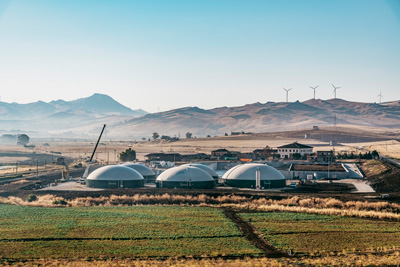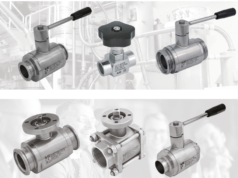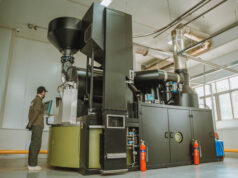 Biomethane. Giving food waste a second life
Biomethane. Giving food waste a second life
Food industry by-products are now an incredible opportunity to produce renewable energy and promote circular and sustainable economies.
With the right technologies, meat and fish industry waste, dairy and confectionery by-products, fruit and vegetable, cereals and tubers residues and the wastewater can be enhanced and transformed into biomethane. For food industries, which can also benefit from the opportunity to use it for out-of-date and returned products, it is one of the technological solutions that best reconciles environmental and economic sustainability.
Producers can feed biomethane directly into the national grid or use it as a green biofuel for product handling fleets, reducing the carbon footprint – the impact of activities on the Global Climate in terms of amount of CO2 that processes generate throughout the life cycle of products – and benefiting from the incentives provided by national legislation.
One of the most prominent companies in the construction and management of biogas and biomethane plants at international level is IES Biogas. The company, which is part of the Snam group, one of the largest operators of energy infrastructures in the world, has set up an entire division, IES Food Industry, dedicated to the Food & Beverage industry: considering the extreme variability of the production processes specific to this sector, it is thus qualified to offer the best technological solutions for optimising the production of biogas from any organic matrix with suitable potential, through an in-depth assessment of the industry and the territorial context where it operates.
Among the technological solutions proposed, the implementation of robust, reliable and flexible CSTR (Continuous Stirred Tank Reactor) is suitable for solid and semi-solid matrices. For liquid matrices with a high organic load, on the other hand, the use of “fast” anaerobic systems such as UASB/EGSB fluidised bed reactors, characterised by high efficiencies in terms of biogas production, reduced organic loads, low hydraulic residence times and small volumes, can maximise biogas production with a consequent reduction in organic load.
For processing high nitrogen digestates and streams, IES Biogas offers a deammonification process, an efficient ammonia removal system using autotrophic microorganisms, which reduces volumes and energy consumption.
There are also the aerobic technologies for the subsequent treatment and refinement of wastewater with SBR (discontinuous sequential process) and MBR (membrane reactors) technologies, which guarantee a further reduction in organic load. Among the final systems, ultra-filtration and reverse osmosis processes are recommended for water recovery, with a view to minimising water consumption with a dedicated approach to ZLD (Zero Liquid Discharge).
As for biogas, IES Food Industry also uses the best plant solutions for treatment and subsequent upgrading, with the focus on maximising yields and feeding the maximum volume of biomethane available into the grid.
In the food industry context, regardless of biomethane production, all the solutions proposed always lead to high energy efficiency targets and minimise operating costs, through the reduction of sludge produced and chemicals used.
For more information: www.iesbiogas.it info@iesbiogas.it









